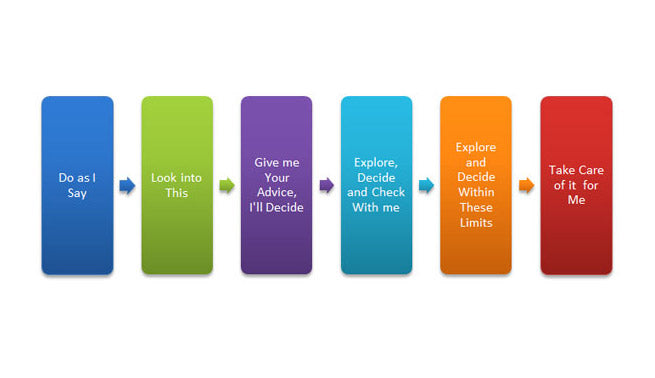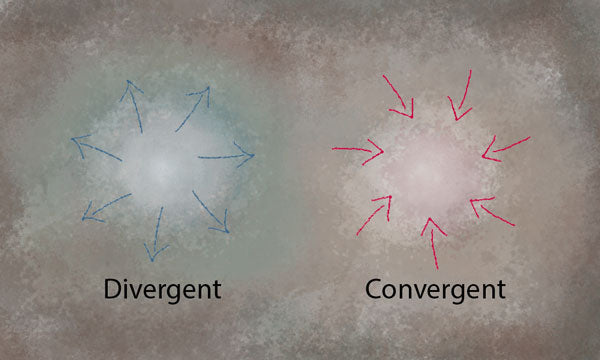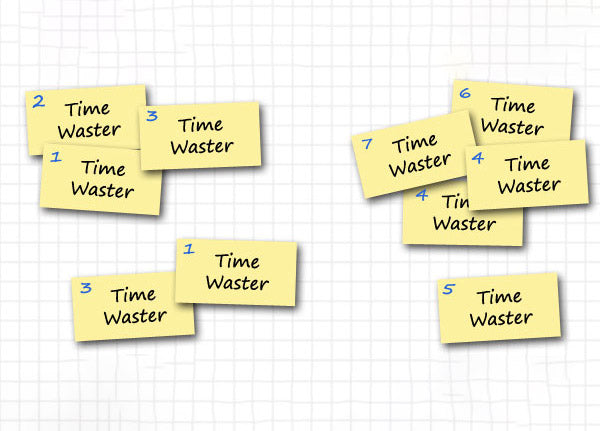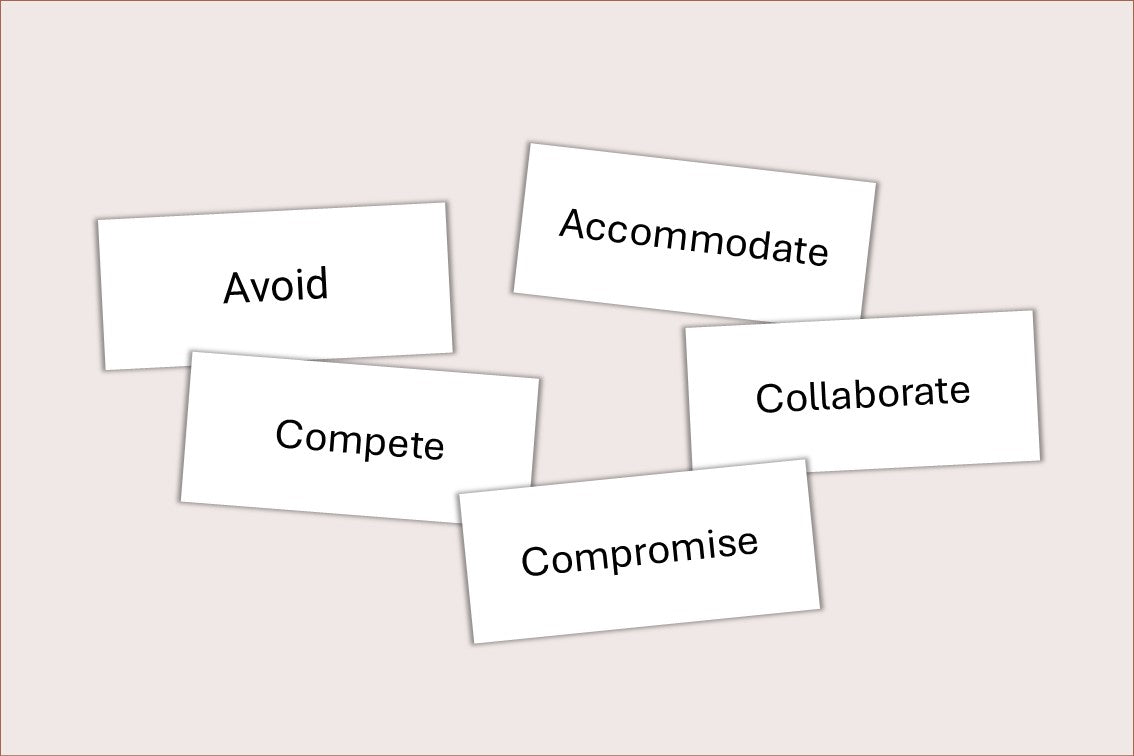Purpose
Delegation is a great way to save time. Apart from saving time, delegation helps motivate your staff by giving them responsibility. Your team will benefit by participating in activities and the decision making process and therefore becomes more capable and autonomous over time. The organisation will benefit from having a pool of staff that can cover each other, take more responsibility and resolve issues on their own.
As a result, a manager must constantly think about delegating tasks to others not just to save time but also to help the team grow and become more capable.
Depending on how much control you want to have over a delegated task, you can choose from one of the six levels of delegation to control the outcome and also how much time you want to save.
In this exercise, participants will learn about these six levels and will participate in an activity to better understand them.
Objective
Consider a particular task that you want to delegate to members of your team and decide which level of delegation is ideal for your specific requirements.
What You Need
- A copy of the “Delegation Form” for each participant provided below.
Setup
- Divide the participants to pairs. If you have an odd number of participants, use a group of 3.
- Brief the participants about delegation and go through the following 6 levels to explain how a manager can incrementally gain time by giving more control away to a delegatee. The 6 levels are presented from the managers point of view:
1. Do exactly as I say. Here is the situation and what I have decided.
- Impact on Control: You have total control over the delegation and the decision making process.
- Impact on Your Time: This provides absolute control but also requires substantial time on your side.
2. Look into this and inform me about various options. I will then decide.
- Impact on Control: You now trust the delegatee to perform a thorough research which you can then safely use to make a decision.
- Impact on Your Time: You can spend less time on this as the delegatee will help you on the task. However, since you are making the decision, you will still need to go over the details and spend some time on the task.
3. Consider this problem and give me your recommendation on how to proceed. I will then decide and share my decision with you.
- Impact on Control: You expect the delegatee to provide recommendations so you only have to use your intuition to confirm the decision rather than carrying the analysis yourself.
- Impact on Your Time: You spend less time on the task as you don’t have to spend as much time on the decision making process. However, since you retain control, if the need arises you can quickly take over and make sure the task is carried out with the right quality.
4. Explore this issue and make a decision. Check with me before going ahead with the decision.
- Impact on Control: You delegate the task and the decision making, but still retain control in going ahead with a decision.
- Impact on Your Time: You spend only a small amount of time “signing off” the tasks. As you are relying heavily on the delegatee for the analysis and the decision, you can save considerable amount of time.
5. Solve this problem. Consider the following parameters. So long as these parameters are satisfied you can make a decision and go ahead with it. Otherwise, check with me.
- Impact on Control: You now trust the delegatee to research and make a decision so long as it is within the limits that you set.
- Impact on Your Time: Minimal time is spent by you mainly to define the task and set the parameters. You are holding the delegatee accountable and have significantly reduced the amount of time needed on your side.
6. Here is the problem. I want you to take care of it. I trust your judgement. Here are the resources available for it. Do what it takes to solve it.
- Impact on Control: You have given ultimate control over the task and the decision making process. The delegatee is now accountable and responsible for the outcome and you have made this very clear. This is a high-level delegation and is usually carried out on strategic decision making when delegating to people who have a high level of autonomy and control over their roles.
- Impact on Your Time: The impact on your time is extremely small. The delegation activity is carried out more as a consultation or a discussion on resources and how decisions could impact other areas of work as oppose to a straight forward delegation activity.
- Distribute the “Delegation Forms” to all participants.
- Ask each pair to take turns and consider a particular task that they want to delegate to a member of their team.
- Ask the delegates to record their answers in their forms.
- Allocate about 15 minutes for this part.
- Bring back everyone together and ask each pair to share their cases.
- Encourage other groups to provide feedback.
- Follow with a general discussion. Most people may know what level of delegation they are comfortable with, but may not know how to progress forward. Emphasise the benefits of moving up the delegation levels. Use the examples provides by various groups to initiate this discussion and use it to illustrate the process.
Timing
Explaining the Exercise: 10 minutes
Activity: 15 minutes
Group Feedback: 15 minutes
Discussion
Are you delegating at the right level? What should you do to be able to delegate at a higher level? What are the specific benefits of delegation at a higher level to you and your team? What did you think of delegation examples of other groups? Where you inspired by their techniques and approach? Can you use these techniques when managing your own team?
Delegation Form
1. Consider a task that you want to delegate to your team members or your colleagues and record it below.
2. Choose a delegation level from the “6 Levels of Delegation” that is suitable for the task and the delegatee. Describe how you approach the delegation task and record it below.
3. What strategies would you use to gradually increase the level of delegation in order to save more time and increase the efficiency of your team and organisation? Record your strategy below so you can discuss it later with the class.
Comments
By Rob Moore @ Thursday, May 24, 2012 1:46 AM
Great Article! I really like this exercise that you put together. The lack of delegation is one of the biggest struggles I have seen in management during my experiences. This exercise will definitely help people feel more comfortable with the process. No one can do it all on their own and be successful. Thanks for sharing this!
Soft Skills Training Materials
Get downloadable training materials
Online Train the Trainer Course:
Core Skills
Learn How to Become the Best Trainer in Your Field
All Tags
Training Resources for You

Course Design Strategy
Available as paperback and ebook

Free Training Resources
Download a free comprehensive training package including training guidelines, soft skills training activities, assessment forms and useful training resources that you can use to enhance your courses.

Our Comprehensive Guide to Body Language

Train the Trainer Resources
Get Insights - Read Guides and Books - Attend Courses
Training Materials
Get downloadable training materials on: Management Training, Personal Development, Interpersonal Development, Human Resources, and Sales & Marketing














Leave a comment
All comments are moderated before being published.
This site is protected by hCaptcha and the hCaptcha Privacy Policy and Terms of Service apply.